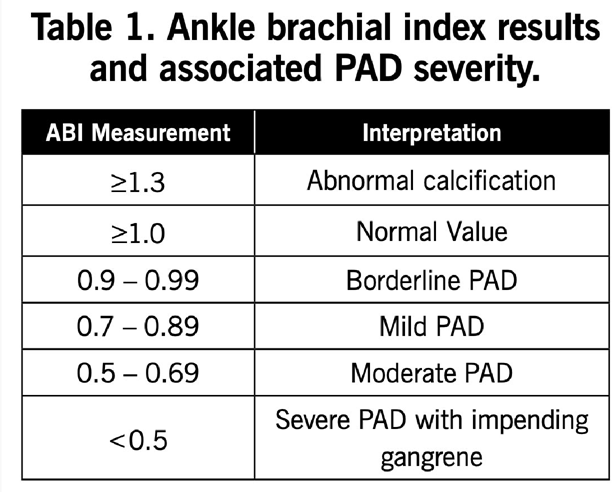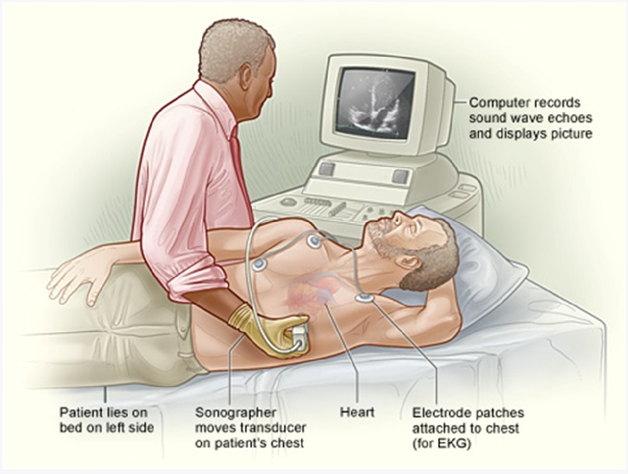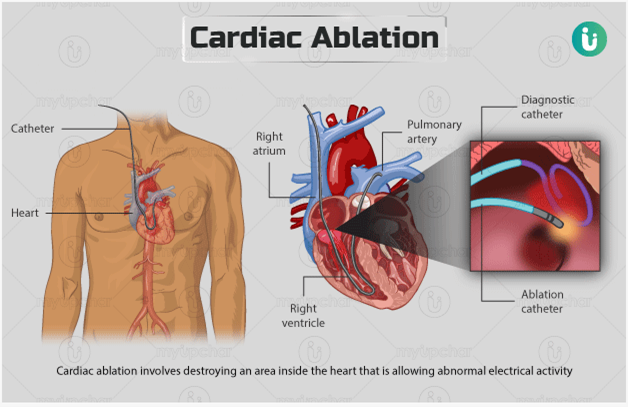While assessing a client, the nurse notes that the client's ankle-brachial index (ABI) of the right leg is 0.40. How should the nurse best follow up this assessment finding?
Assess the client's use of over-the-counter dietary supplements.
Implement interventions relevant to arterial narrowing
Encourage the client to increase intake of foods high in vitamin K
Adjust the client's activity level to accommodate decreased coronary output.
The Correct Answer is B
The nurse should best follow up the assessment finding of an ankle-brachial index (ABI) of 0.40 in the right leg by implementing interventions relevant to arterial narrowing.
An ankle-brachial index is a non-invasive test used to assess peripheral arterial disease (PAD). An ABI value below 0.90 indicates significant arterial narrowing and impaired blood flow to the lower extremities. An ABI of 0.40 suggests severe arterial narrowing, which puts the client at risk for reduced perfusion and potential complications such as tissue ischemia, ulceration, and gangrene.
Implementing interventions relevant to arterial narrowing is crucial in this case. These interventions may include:
- Collaborating with the healthcare provider to develop a treatment plan: This may involve prescribing medications to improve blood flow, such as antiplatelet agents or vasodilators.
- Encouraging lifestyle modifications: This can include smoking cessation, regular exercise, and maintaining a healthy diet low in saturated fats and high in fruits and vegetables.
- Promoting optimal cardiovascular health: This can involve managing other risk factors for arterial narrowing, such as hypertension, diabetes, and high cholesterol levels.
- Educating the client about the signs and symptoms of PAD: This includes teaching them to monitor for changes in skin color, temperature, and sensation in the affected limb, as well as the importance of seeking prompt medical attention if these changes occur.

Let's review the other options:
Assessing the client's use of over-the-counter dietary supplements: While it is important to assess for potential interactions between medications and dietary supplements, this would not be the immediate follow-up action for a severely reduced ABI.
Encouraging the client to increase intake of foods high in vitamin K: While maintaining a balanced diet is important for overall health, increasing vitamin K intake is not specifically indicated for addressing arterial narrowing or improving the ABI.
Adjusting the client's activity level to accommodate decreased coronary output:
Coronary output refers to blood flow to the heart muscle. Arterial narrowing in the leg does not directly affect coronary output. However, it is important to encourage appropriate physical activity for the client based on their overall cardiovascular health and exercise tolerance.
Nursing Test Bank
Naxlex Comprehensive Predictor Exams
Related Questions
Correct Answer is A
Explanation
The nurse should teach the client that the transthoracic echocardiography is a noninvasive test and that nothing will be inserted into the client's body.
Transthoracic echocardiography is a diagnostic procedure that uses ultrasound to create images of the heart's structures and assess its function. It is a noninvasive test, meaning that it does not involve any insertion of instruments or devices into the body. Instead, a transducer is placed on the chest to obtain images of the heart.
The statement about managing pain aggressively during the procedure is not applicable to transthoracic echocardiography. It is generally a painless procedure that does not cause discomfort.
Transthoracic echocardiography primarily provides detailed images of the heart's structures and function, such as the chambers, valves, and pumping action. It does not specifically profile the heart's electrical activity, which is usually assessed using an electrocardiogram (ECG) or other specialized tests.
Regarding bed rest after the test, there is typically no need for bed rest following transthoracic echocardiography. The client can usually resume normal activities immediately after the procedure. However, the nurse should provide specific instructions based on the client's condition and any additional tests or interventions planned.

Correct Answer is D
Explanation
The procedure uses electrical energy to destroy areas of the conduction system: Catheter ablation is a minimally invasive procedure performed to treat abnormal heart rhythms, such as atrial flutter. During the procedure, a catheter is inserted into the heartand used to deliver electrical energy to specific areas of the heart tissue. This energy is used to destroy or ablate the abnormal conduction pathways that are causing the atrial flutter.
Let's go through the other options and explain why they are not accurate:
The procedure stimulates the growth of new pathways between the atria: Catheter ablation does not stimulate the growth of new pathways. Instead, it aims to eliminate or modify existing abnormal pathways in the heart to restore normal electrical conduction.
The procedure uses cold therapy to stop the formation of the flutter waves: Catheter ablation does not use cold therapy. It primarily utilizes radiofrequency energy or other sources of heat to ablate the targeted areas of the heart tissue.
The procedure prevents or minimizes the patient's risk for sudden cardiac death: While catheter ablation can be an effective treatment for certain arrhythmias, including atrial flutter, it is not primarily performed to prevent or minimize the risk of sudden cardiac death. Its main purpose is to restore normal heart rhythm and alleviate symptoms associated with the arrhythmia.

Whether you are a student looking to ace your exams or a practicing nurse seeking to enhance your expertise , our nursing education contents will empower you with the confidence and competence to make a difference in the lives of patients and become a respected leader in the healthcare field.
Visit Naxlex, invest in your future and unlock endless possibilities with our unparalleled nursing education contents today
Report Wrong Answer on the Current Question
Do you disagree with the answer? If yes, what is your expected answer? Explain.
Kindly be descriptive with the issue you are facing.
